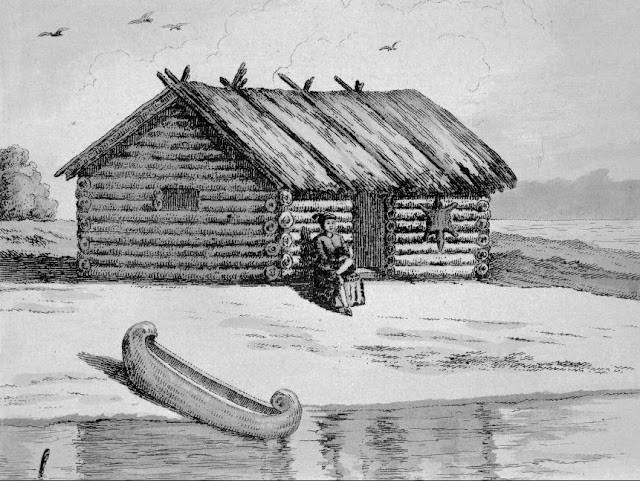 |
| Jean Baptiste Pointe de Sable's 1784 farm is historically recognized as the first settlement he called "audio: Eschikagou ►" on the north branch of the Chicago River, known as the Guarie River. |
 |
| Pointe de Sable's second house became known as the Kinzie Mansion. Antoine Ouilmette's house is noted. Illustration from 1827. |
Pointe de Sable built a second trading post/cabin on the north side of the Chicago River, very close to the river's mouth. By the time he sold the second cabin (illustration) in 1800 for 6,000 Livres ($1,200), he had developed the property into a commodious, well-furnished French-style house with numerous outbuildings.
The Wayne County Register of Deeds in Detroit—Chicago was part of that county during Northwest Territory days—debunks many of the Kinzies' claims. Their records show Jean Lalime, not Joseph Le Mai, bought Ponte de SSable'strading post in 1800, bankrolled by Lalime and Kinzie's mutual boss, fur trader William Burnett. There COULD NOT have been confusion because Kinzie signed the deed as a witness.
OWNER and Successive Occupants:
- Jean Lalime & William Burnett: 1800-1803, owner.
- A careful reading of the Pointe de Sable─Lalime sales contract indicates that William Burnett was not just signing as a witness but also financing the transaction. Therefore, he had controlling ownership.
- John Kinzie Family: 1804-1812
- Widow Leigh & Mr. Des Pins: Renter - 1812-1816
- John Kinzie Family: 1817-1829
- John Kinzie moved to Chicago around 1802-1803. However, it’s unclear whether he immediately took ownership of a cabin. He eventually gained ownership under somewhat murky circumstances.
- Anson Taylor: 1829-1831 (store and home).
- Dr. E.D. Harmon: 1831 - home and frontier doctor's office.
- Jonathan N. Bailey: 1831 - home and post office.
- Mark Noble, Sr.: 1831-1832.
- Judge Richard Young: 1832- six weeks during circuit court travel.
- Unoccupied in 1832. Dilapidated beyond repair.
- Nonexistent by 1835.
 |
| John Kinzie Mansion and Fort Dearborn. |

[1] Guarie River: The first non-indigenous settler at Wolf Point may have been a trader named Guarie. Writing in 1880, Gurdon Saltonstall Hubbard, who first arrived in Chicago on October 1, 1818, stated that he had been told of Guarie by Antoine De Champs, the man in charge of the "Illinois Brigade" of the American Fur Company, and Antoine Beson. They had been traversing the Chicago Portage annually since about 1778. Hubbard wrote that De Champs had shown him evidence of a trading house and the remains of a cornfield supposed to have belonged to Guarie. The cornfield was located on the west bank of the North Branch of the Chicago River, a short distance from the forks at what is now Fulton Street; early settlers named the North Branch of the Chicago River the Guarie River or Gary's River.
"The Autobiography of Gurdon Saltonstall Hubbard" (pdf), by Gurdon Saltonstall Hubbard, was published in 1911.

No comments:
Post a Comment
The Digital Research Library of Illinois History Journal™ is RATED PG-13. Please comment accordingly. Advertisements, spammers and scammers will be removed.